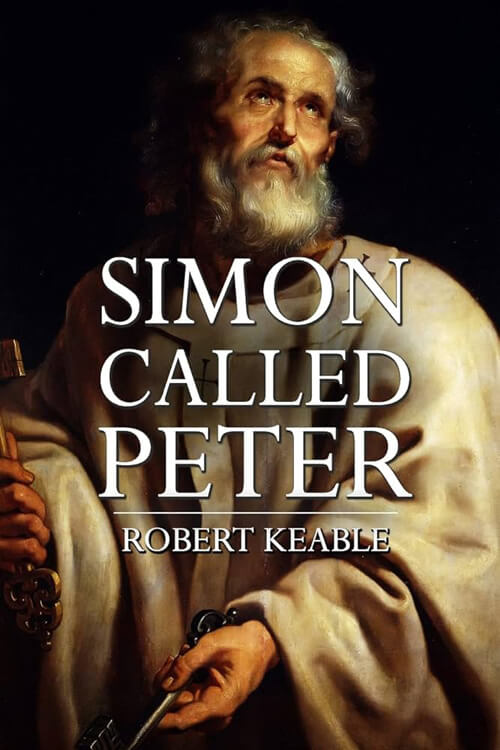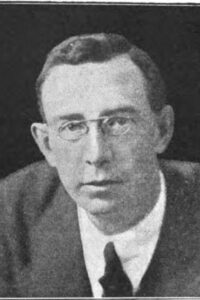
Simon Called Peter
London lay as if washed with watercolor that Sunday morning, light blue sky and pale dancing sunlight wooing the begrimed stones of Westminster like a young girl with an old lover. The empty streets, clean-swept, were bathed in the light and appeared to be transformed from the streets of weekday life. Yet half of Londoners lay late abed, perhaps because six mornings a week of reality made them care little for one of magic.
Peter, nevertheless, saw little of this beauty. He walked swiftly as always, and he looked about him, but he noticed none of these things. True, a fluttering sheet of newspaper headlines impaled on the railings of St. Margaret’s held him for a second, but that was because its message was the one that rang continually in his head and had nothing at all to do with the beauty of things that he passed by.
He was a perfectly dressed young man, in a frock coat and silk hat of the London clergyman, and he was on his way to preach at St. John’s at the morning service. Walking always helped him to prepare his sermons, and this sermon would ordinarily have struck him as one well worth preparing. The pulpit of St. John’s marked a rung up in the ladder for him. That great fashionable church of mid-Victorian faith and manners held a congregation on Sunday mornings for which the Rector catered with care. It said a good deal for Peter that he had been invited to preach. He ought to have had his determined scheme plain before him, and a few sentences, carefully polished, at hand for the beginning and the end. He could trust himself in the middle and was perfectly conscious of that. He frankly liked preaching, liked it not merely as an actor loves to sway his audience, but liked it because he always knew what to say, and was keen that people should see his argument. And yet this morning, when he should have been prepared for the best he could do, he was not prepared at all.
Strictly, that is not quite true, for he had a text, and the text focused his thoughts. But it was too big for him. Like some at least in England that day, he was conscious of staring down a lane of tragedy that appalled him. Fragments and sentences came and went in his head. He groped for words, mentally, as he walked. Over and over again he repeated his text. It amazed him by its simplicity; it horrified him by its depth.
Hilda was waiting at the pillar box as she had said she would be, and little as she could guess it, she irritated him. He did not want her just then. He could hardly tell why, except that, somehow, she ran counter to his thoughts altogether that morning. She seemed, even in her excellent brown costume that fitted her fine figure so well, out of place, and out of place for the first time.
Read or download Book
Robert Keable
Robert Keable (6 March 1887 – 22 December 1927) was a British novelist, formerly a missionary and priest in the Church of England.
Biography.
He resigned his ministry following his experiences in the First World War and caused a scandal with his 1921 novel Simon Called Peter, the tale of a priest’s wartime affair with a young nurse. The book sold 600,000 copies in the 1920s alone, was referenced in The Great Gatsby, and was cited in a double murder investigation. Fêted in the United States, but critically less than well-received, Keable moved to Tahiti where he continued to write, producing both novels and theological works, until his death at age 40 of kidney disease.
Keable was raised in Bedfordshire and educated at Magdalene College, Cambridge. He entered a theological college after graduation and was ordained a priest in 1911. He spent the next several years as a missionary in Africa, stationed in Zanzibar and Basutoland, before returning to Europe as an army chaplain during the First World War. There, he met and began a relationship with a young nurse, Grace Eileen Joly Beresford Buck, a development over which he eventually quit the Church of England and left his wife, Sybil. Returning to England after the war, Keable resigned his ministry and began to write novels: his first, 1921’s Simon Called Peter, became a runaway success and launched Keable into a life of literary celebrity. Increasingly disillusioned with the hypocrisies he saw in contemporary British life, he and Buck left Europe for Tahiti in 1922. The couple lived there happily until Buck died in childbirth in 1924, after which Keable’s health began to fade. He nonetheless began a later relationship with a Tahitian woman, Ina, with whom he had a son, and continued to publish novels until his death of a kidney condition in 1927.
Keable’s most famous publication was his first novel, Simon Called Peter, but he produced a prodigious literary output, spanning theological tracts through poetry to travel guides. Simon Called Peter’s sequel, Recompense was made into a film, and his later novels all attracted substantial attention. His writings generally met with much greater popular than critical approbation, and Simon Called Peter was sufficiently incendiary to be banned. The book nonetheless became a contemporary best-seller.
Much of Keable’s fiction contained autobiographical elements, often centering on his attitudes toward and experience of the Christian religious establishment. As well as these fictional explorations he produced a final, non-fiction work, The Great Galilean, outlining the religious views he developed during a lifetime of uneasy relationship to Anglicanism and Catholicism. He came to believe that the historical Jesus bore little relationship to the Jesus of Christian tradition, and, in The Great Galilean, attempted to reconcile his ambivalence about the orthodoxies of the Church with his enduring belief in an all-loving God. Keable’s views earned him many unfavorable reviews and the contempt of the church in which he had practiced but foreshadowed ideas of free love that became prominent later in the 20th century.






